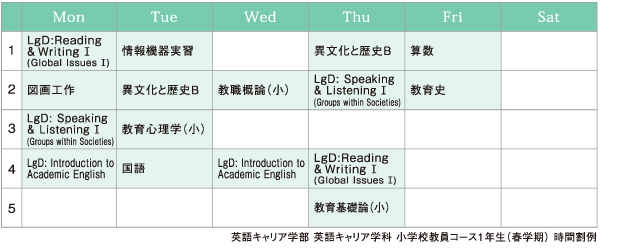Program Overview and Curriculum
Educational Goals
Diploma Policy of the College of International Professional Development Elementary School Education Program
The College of International Professional Development confers a Bachelor’s Degree in Education to students who have acquired English proficiency, international understanding, strong foundations for a career in English supported by the capacity for multicultural coexistence, and a Type 1 elementary school teacher’s license.
Cultivating Practical Teaching Skills in all Areas of Elementary School Education
Students develop “practical teaching skills” in all necessary areas of elementary school education: class subjects—Japanese, Social Studies, Mathematics, Science, Life Environment Studies, Music, Arts and Crafts, Home Economics, and Physical Education—as well as Morality, Foreign Language Activities, Integrated Studies, and Special Activities.
Cultivating Thorough International Awareness and Solid English Communication Skills
Students acquire “international awareness” that includes respect for different values and attitudes and a broad global perspective within a society of multicultural coexistence. In addition, through listening, speaking, reading, and writing in English, students develop “English communication skills” needed to accurately grasp the meanings of words and understand people with different cultural backgrounds.
Curriculum Features
The curriculum of the Elementary School Education Program in the College of International Professional Development has the following features.
Curriculum Policy
1. The course aims to cultivate specialized knowledge and practical teaching skills in all areas of elementary school education, including each class subject as well as Morality, Foreign Language Activities, Integrated Studies, and Special Activities, with the primary goal of cultivating “zest for living” in children.
2. The curriculum actively incorporates classroom-based training and volunteer activities to nurture individuals with a passion for education, sense of mission, and practical teaching skills.
3. Leveraging our strengths as a university of foreign studies, we provide specialized subjects in areas, such as English linguistics and literature, together with liberal arts education spanning fields, such as cultural studies, history, and sociology. These subjects are aimed to help students grasp “foreign language studies” in general, by providing a comprehensive education that includes a high level of expertise.
Small-Group Instruction with 30-Student Year Groups
The Elementary School Education Program is conducted in small groups, with only 30 students in each year of study. The program is taught by nine full-time faculty members with extensive experience, including specialists in various school subjects and those with practical experience in elementary schools and Boards of Education. Along with subject instruction in class, these faculty members also provide detailed individualized guidance to students on learning and all aspects of student life, thereby supporting them through each step of the four-year program.
Years 1 to 3: Studying the Theory and Practice of Elementary Education
Students study both theory and practice to develop “practical teaching skills” in all areas of elementary school education. Lower-year students study introductory and basic theoretical courses, and upper-year students study a combination of theory, practice, and hands-on experience. In the mathematics/science and skills-based subjects, study is conducted in dedicated facilities, such as laboratories, music rooms, home economics rooms, and calligraphy/arts and crafts rooms.
Years 1 to 3: Nurturing Teachers who Conduct Global Education at the Elementary Level
We offer a curriculum through which students can learn about each school subject, focusing on the elementary level, from a global educational perspective. All students study the Global Education and Elementary School English Language Teaching Practices subjects, which connect elementary school education and English education with electives on multicultural coexistence and understanding also available for the study of global regions and cultures. In addition, students can take part in a five-week teacher training program at Flinders University in Australia as a short-term exchange program during university holidays.
Year 2: Experiencing Internships Year 3: Teaching Practica for All Students
In collaboration with local Boards of Education in Hirakata City and elsewhere, students provide support for Foreign Language Activities and extracurricular activities conducted at local elementary schools. By completing an internship, students build an understanding of actual conditions and needs in education and develop practical teaching skills from an early stage. In the third year, all students must complete a four-week teaching practicum to confirm their qualities and aptitude as a teacher.
Year 4: Enhancing and Developing Practical Teaching Skills and English Communication Skills
Students consolidate, enhance, and develop the passion for education and sense of mission developed in years one through three, as well as the knowledge, international understanding, and capacity for multicultural coexistence gained through the study of practical teaching skills and English communication skills.
Curriculum Content
We have established the following subjects to realize the human resource cultivation goals of the Elementary School Education Program in the College of International Professional Development.
Integrated Specialized Subjects
Students learn about English linguistics and social science through integrated study conducted in English and Japanese. Through a content-based approach to learning, students aim to develop advanced English proficiency and understand various aspects of English linguistics, social science, and pedagogy while acquiring basic knowledge in these fields.
Specialized Elementary Education Subjects
The course aims for mastery of the knowledge and English communication skills needed for global education that meets the needs of a multicultural society, as well as the ability to play a role in elementary school education aimed at cultivating “zest for living” in children through all-round education.
- Specialized teacher training subjects
- Study of the significance and theories of teaching profession at the elementary level, which aims to foster “zest for living” in children through all-round education
- Study of the significance and theories of teaching profession at the elementary level, which aims to foster “zest for living” in children through all-round education
- Specialized subjects on elementary school subjects
- Study of specialized theories and knowledge on subjects spanning all areas of elementary education
- Study of specialized theories and knowledge on subjects spanning all areas of elementary education
- Specialized subjects on elementary subject-teaching methods
- Study of subject-teaching methods spanning all areas of elementary education
- Study of subject-teaching methods spanning all areas of elementary education
- Elementary pedagogy subjects
- Study of the theories and knowledge of pedagogy required for elementary school teachers
- Study of the theories and knowledge of pedagogy required for elementary school teachers
- English communication subjects
- Study of specialized fields in English through a content-based approach to learning as well as improvement of English language skills while acquiring the wide-ranging knowledge required for an elementary school teacher
- Study of specialized fields in English through a content-based approach to learning as well as improvement of English language skills while acquiring the wide-ranging knowledge required for an elementary school teacher
- Language education subjects
- Acquisition of systematic knowledge of linguistics and English linguistics as well as study of theories and practical skills for teaching foreign language activities at elementary schools
- Acquisition of systematic knowledge of linguistics and English linguistics as well as study of theories and practical skills for teaching foreign language activities at elementary schools
- Multicultural understanding subjects
- Development of knowledge and thinking skills required to understand different cultures through study in varied fields, such as sociology, international relations, and area studies
- Development of knowledge and thinking skills required to understand different cultures through study in varied fields, such as sociology, international relations, and area studies
General Education Subjects
In addition to studying specialized education subjects, students develop a broad educational grounding and thinking skills. In subjects where credits are awarded for internships and volunteer activities, students develop their practical teaching skills by providing support for foreign language activities and extracurricular activities at local elementary schools.
Course Enrollment Example
First Year Spring Semester Timetable

